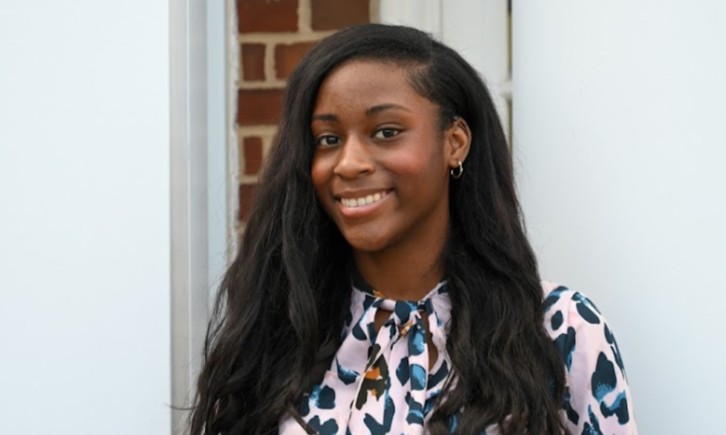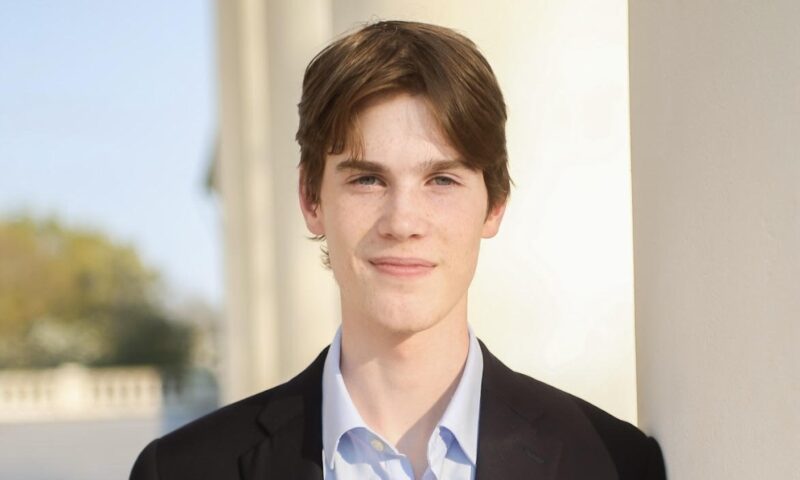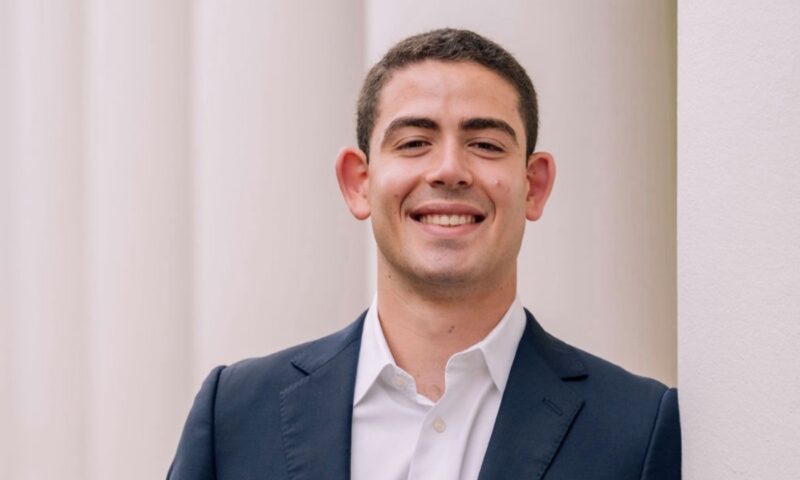Three students, all from Commack, Long Island, are finding themselves at UVA—but not in any of the ways that may come to mind. Theirs is a self-directed discovery being accomplished as they examine and gather insights from the pathways of others, speaking to them about their lives, methods, experiences, philosophies, and successes.
This exploration journey shared by Justin Guerra (A&S ’24), Marlee Reiter (McIntire ’25), and Chapin Zerner (A&S ’25) has taken the form of the “Learning Out Loud” podcast.
Reiter was good friends with Zerner in high school and met Guerra, thinking that the fourth-year looked familiar, by chance at one of her daily crack-of-dawn gym sessions—a habit all three share. After introducing herself, she learned that the transfer student from Hofstra University who was majoring in Applied Statistics was, like she and Zerner, from the same downstate New York hometown. They had a long talk, and later, she introduced Guerra to Zerner, resulting in the three becoming fast friends who realized they shared many views about life, an irrepressible curiosity for education that often occurs outside of a classroom, and similar hopes for their future.
“We got to know each other as a team and thought about potentially starting a business, but we wanted to feel that out first,” Zerner says, explaining that they were unsure of the best way to go about it. “There was a lot of brainstorming and kicking ideas around until we landed on talking to as many people as possible who have achieved what we want to achieve and then using those lessons to decide what our next step should be.”
“It naturally worked out that we decided we should start talking to people ourselves,” says Reiter. “And not only should we do that, but we should share that experience with others.”
That decision led them to launch “Learning Out Loud.”
Positive Mindsets and Process Steps
Zerner, an Interdisciplinary major studying Neuroscience, Statistics, and Entrepreneurship, had long been interested in scientific research and working in labs. On a whim, upon reading a paper by Harvard Medical School’s David Sinclair, he pitched himself in an email and landed an interview. The result of that outreach was spending a few months in Boston at an entrepreneurship-focused lab in the summer of 2022, an experience that solidified his interest in merging science analytics and business.
“Just taking the step to reach out was a turning point for me and something that I’ve done consistently since. And that’s how we get some of our podcast guests,” he says.
Reiter says that throughout her life, she has considered herself fortunate that her parents reinforced the lesson that effort—not grades—prove to be the most important measure of worth. It stuck with her when she decided to apply to McIntire comparably late in the game as her peers were wrapping up their prerequisite courses. Admissions warned her it was risky to apply so late, but she felt compelled to try.
“I decided that if there was a slight chance, I’d do it. Last semester, I took all the prerequisites at once, and then over the summer, I was still taking them, because I got in,” she says, noting that putting in the work and reaching out to people at McIntire are what made the difference in her academic life.
Guerra rightfully considers it an accomplishment to have transferred to UVA while completing coursework at another university at the same time he was immersed in the summer internship recruitment process. He sees that achievement as another example of a philosophy that he shares with his podcast peers: “We all learned as we go about this that the timeframe you need to look at is so much longer. You can’t expect the hard work to pay off right away because there’s such a high degree of randomness or luck in the outcome. But if you flip that around and continue at whatever it is for a long enough time, eventually it will work out and you’ll see some positive result from it.”
Reiter says even when things don’t appear to be going the way that she might initially want, she doesn’t jump to view it negatively. “It always leads to something else that does work out—it just might not be the original goal.”
“It’s process over outcome,” says Zerner. “As long as the process is correct, if you continue with that process for a long enough time, then the probability that the outcome is going to be what you want increases over time.” He recalls an experience last summer, when a client he was trying to close for a data analytics company fell through; it turned out to be a boon, as it freed him to be at home—with Reiter and Guerra nearby. “That allowed us the opportunity to record all in one place, to do the podcast a lot more consistently than we otherwise would have if we were scattered across the Northeast. One thing leads to the next.”
Guerra sums up their shared philosophy about surmounting the unpredictability of results by quoting a guest of the podcast, former McIntire Professor Brendan Richardson: “When it comes to outcomes, his line was ‘high participation, low attachment.’ You can’t look at the outcome because you don’t have total control over that. You need to do something for a long enough period of time until the outcome goes your way.”
Inspired to Improve
So what is it that drives these undergrads to want to seek a practical wisdom that they can share with students everywhere?
They’re inspired by making the most of the hands they’ve been dealt, doubling down on their skills, and making the most of being UVA students with access to an impressive network of faculty and alumni—who in turn represent a connection to an even wider world with networks upon networks of people with insights to share.
“I have a vision in my head for the type of life I want to live and the type of person I want to be,” Reiter says. “I try to build that every day to try to get to that point,” she says, citing small habits like exercising regularly and eating well, but also speaking to as many people as she can to understand the manifold possibilities in life and what’s possible.
Zerner says that while he’s not sure what he’s capable of achieving, he is intent on getting as close to “maxing out, whatever that is,” alluding to the financial concept of compounding interest, only in terms of experiential impact based on a dedication to effort now in order to produce a greater benefit in their lives 10, 20, or more years in the future. “The common theme for all three of us is maximizing options.”
Guerra agrees, saying that while he has no idea what he’ll specifically want out of life in decades to come, he knows that putting the time in now will give him the freedom to pursue those things later. He says that those he and his co-hosts speak with often discuss the importance of having that independence—and it being the consequence of nothing short of a commitment to doing the hard work up front. “It’s simple, but that’s the way that I look at it,” he says.
That dedication can be seen in “Learning Out Loud.” As of September 2023, the trio has produced nearly 20 episodes, and they remain excited by the quality and quantity of guests they’ve been able to speak with for the podcast.
Entrepreneurs and investors make up the bulk of the weekly installments, including names such as Alex Russell (McIntire ’16), Founder of Nothing Special; Erika Bahr (M.S. in Business Analytics ’23), Founder and CEO of Invest Capital AI; Conscious Leadership Coach Dolores Stevens (A&S ’07); Clinical Psychologist and UVA Professor Tim Davis; and entrepreneur and McIntire Professor Chip Ransler.
“Every time we have someone who we email, or we reach out to and they say yes, it’s a like a nice little jolt of excitement that they would agree to it,” says Zerner.
Reiter says that both having the opportunity to talk to so many different types of people in different industries and learning how well the three students have collaborated and taken on different roles—from marketing, to finding guests, to the technical editing and uploading of the podcast—have been most valuable to her. “Even though this isn’t necessarily a business yet, it’s showing us how we would work together if this became one, which is what our goal is. It’s fun doing this together. And we don’t want to let ourselves down, but also, we don’t want to let each other down. It’s motivating.”
While they have had positive experiences speaking to all the guests they have interviewed—some of whom they were thrilled to talk to even though they agreed in advance not to record or discuss it on the podcast—they were particularly pleased with the length and quality of the conversation they had with Richardson. Zerner holds it up as the ideal of what they would want from an episode.

The “Learning Out Loud” hosts interview Warren Thompson (Darden ’83), President and Chairman of Thompson Hospitality, for an upcoming episode. Photo by by Anna Kariel.
As they continue to seek more guests—and are more than open to being directly contacted with suggestions!—a dream guest remains Alex Hormozi, especially for Guerra, who admits to talking about him too much.
“He’s very relatable for me. Went to college, went the consulting route, but then wanted to do something different,” Guerra says. “He started opening gyms, and he worked his way up from that to teaching people how to open their own gyms to now teaching people about business. I look up to him and his content because it’s so directly valuable. You can watch 10 minutes and go change your own behavior.”
“We all love him; we just don’t talk about him as much as Justin,” says Zerner with a laugh.
If or when they snag Hormozi for an episode aside, their aspirations remain high.
Guerra insists that there is much to be learned studying different areas of life that can be instructive to others his age. “We’re gathering information, talking to these people, and figuring it out. We think it can be valuable to other people. We want to talk to more people to figure out what they need and provide it to other college students.”
Much like how they are taking in information to inform their lives, Zerner says they welcome constructive criticism and input to make the podcast better: “We have this grand vision about what we think this could turn into, but we actually have to do that on a day-to-day basis for students, faculty, alumni, or whoever is listening. We want to know how we can improve.”
As Reiter notes that they began “Learning Out Loud” by speaking with entrepreneurs in order to gain insights about business, they’ve come to understand their quest encapsulates it while simultaneously going well beyond that initial concern. “We’re actually just learning how to live a successful life,” she says. “We’re figuring out what the common threads are connecting all these different people in different industries, and we’re trying to distill that information to create a formula for people to follow.”
It’s a high bar for a student-led podcast. Yet even if these three don’t meet that lofty goal to the letter, you can be sure that their impressive determination will bring them great success somehow, some way soon.



